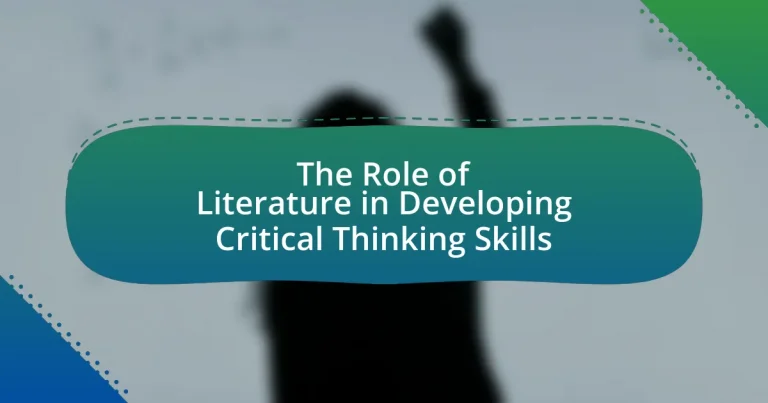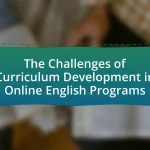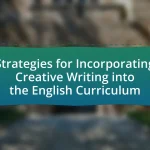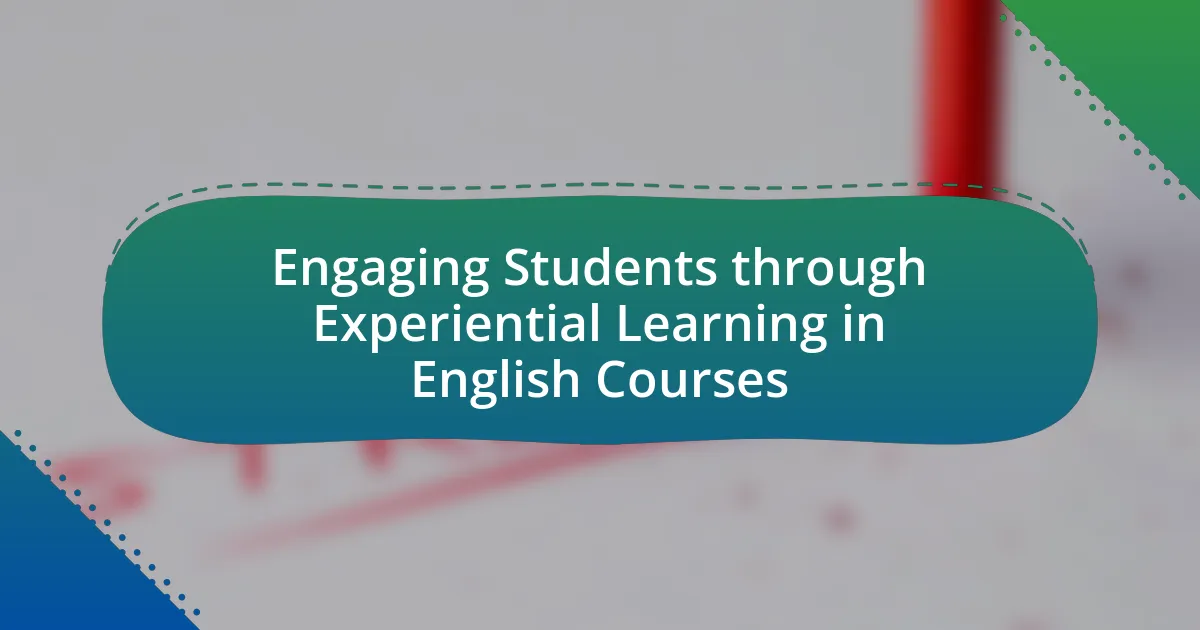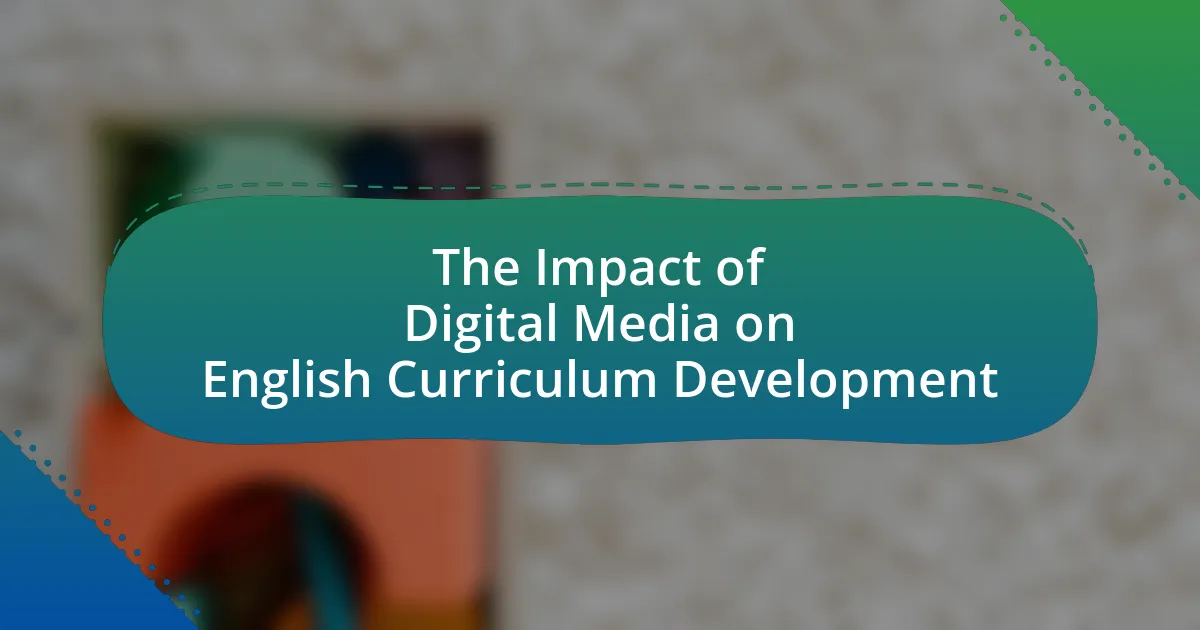The article examines the significant role of literature in developing critical thinking skills. It highlights how engaging with complex themes, characters, and narratives encourages readers to analyze diverse perspectives, evaluate arguments, and identify biases. Key literary elements such as symbolism, character development, and narrative structure are discussed for their contributions to critical analysis. Additionally, the article explores the impact of different genres on critical thinking, the importance of discussions and writing in literature studies, and the challenges educators face in teaching literature for critical thinking development. Overall, it emphasizes the necessity of integrating literature into curricula to enhance analytical skills and cognitive flexibility.
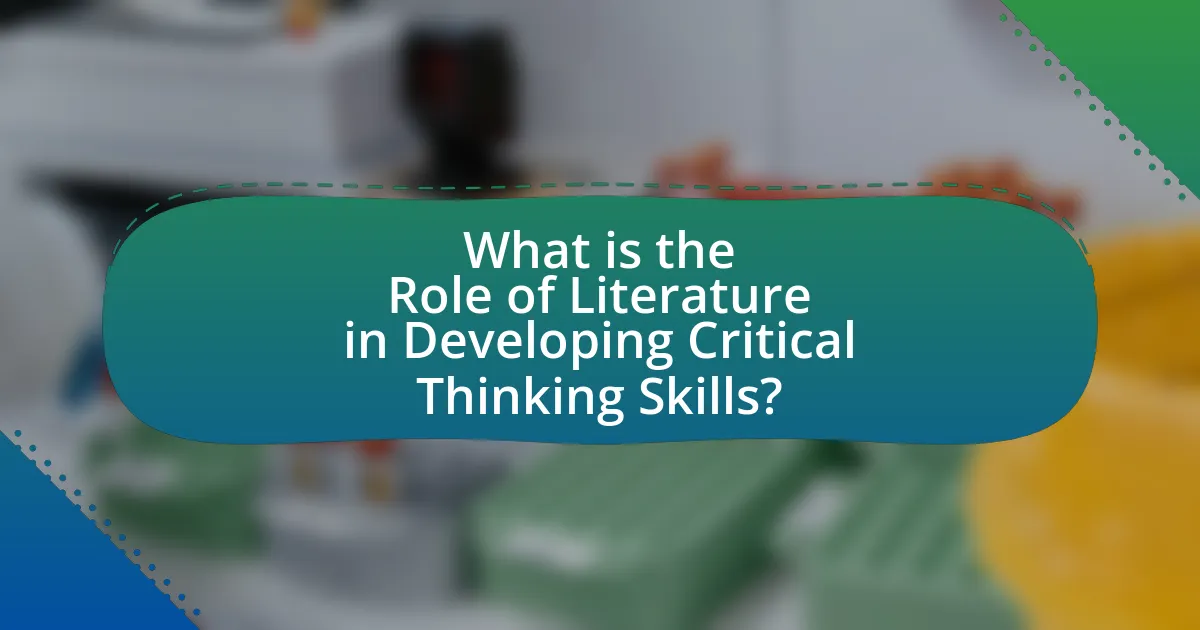
What is the Role of Literature in Developing Critical Thinking Skills?
Literature plays a crucial role in developing critical thinking skills by encouraging readers to analyze complex themes, characters, and narratives. Engaging with diverse perspectives in literature fosters the ability to evaluate arguments, identify biases, and draw connections between ideas. Studies, such as those conducted by the National Council of Teachers of English, indicate that literature enhances cognitive skills by prompting discussions that require interpretation and reasoning. This analytical engagement with texts cultivates a deeper understanding of human experiences, ultimately sharpening critical thinking abilities.
How does literature influence critical thinking abilities?
Literature enhances critical thinking abilities by encouraging readers to analyze complex characters, themes, and narratives. Engaging with diverse perspectives in literature fosters the ability to evaluate arguments and make reasoned judgments. Studies, such as those conducted by the National Council of Teachers of English, indicate that reading literature improves comprehension and analytical skills, as it requires readers to interpret meaning and infer underlying messages. This analytical engagement with texts cultivates a mindset that values questioning and critical evaluation, essential components of effective critical thinking.
What specific literary elements promote critical analysis?
Literary elements that promote critical analysis include symbolism, theme, character development, and narrative structure. Symbolism allows readers to explore deeper meanings behind objects or actions, encouraging them to think critically about the text’s implications. Themes provide overarching messages that invite analysis of societal issues or human experiences, prompting readers to engage with the text on a more profound level. Character development reveals motivations and conflicts, fostering empathy and critical reflection on human behavior. Narrative structure, including point of view and pacing, influences how a story is perceived, leading readers to analyze the reliability of the narrator and the impact of storytelling techniques. These elements collectively enhance critical thinking by challenging readers to interpret, evaluate, and synthesize information within the text.
How do different genres of literature affect critical thinking?
Different genres of literature enhance critical thinking by providing diverse perspectives, themes, and narrative structures that challenge readers to analyze, interpret, and evaluate information. For instance, fiction often encourages empathy and understanding of complex human emotions, while non-fiction presents factual arguments that require logical reasoning and evidence evaluation. Research by the National Council of Teachers of English indicates that exposure to various literary genres fosters analytical skills, as readers must discern author intent, context, and bias. This engagement with different literary forms cultivates a more nuanced understanding of issues, ultimately strengthening critical thinking abilities.
Why is critical thinking important in literature?
Critical thinking is important in literature because it enables readers to analyze, interpret, and evaluate texts critically. This analytical approach allows individuals to discern underlying themes, question authorial intent, and assess the validity of arguments presented within literary works. Research indicates that engaging with literature fosters cognitive skills such as inference-making and perspective-taking, which are essential for critical thinking. For instance, a study published in the Journal of Educational Psychology by Paul and Elder highlights that literature encourages readers to confront complex moral dilemmas, enhancing their ability to think critically about real-world issues.
How does critical thinking enhance comprehension of literary texts?
Critical thinking enhances comprehension of literary texts by enabling readers to analyze, evaluate, and interpret the underlying themes, characters, and narrative structures. This analytical approach allows readers to engage deeply with the text, fostering a better understanding of the author’s intent and the socio-cultural context in which the work was created. Research indicates that critical thinking skills, such as questioning assumptions and recognizing biases, lead to improved interpretation and retention of literary content, as evidenced by studies showing that students who practice critical analysis demonstrate higher levels of comprehension and engagement with texts.
What role does interpretation play in developing critical thinking through literature?
Interpretation plays a crucial role in developing critical thinking through literature by enabling readers to analyze, evaluate, and synthesize complex ideas and themes. Engaging with literary texts requires individuals to interpret characters’ motivations, plot developments, and underlying messages, fostering deeper cognitive processes. For instance, studies have shown that literature encourages readers to question assumptions and consider multiple perspectives, which are essential components of critical thinking. Research by the National Council of Teachers of English indicates that literature discussions enhance students’ analytical skills, as they must articulate their interpretations and defend their viewpoints, thereby reinforcing their ability to think critically.
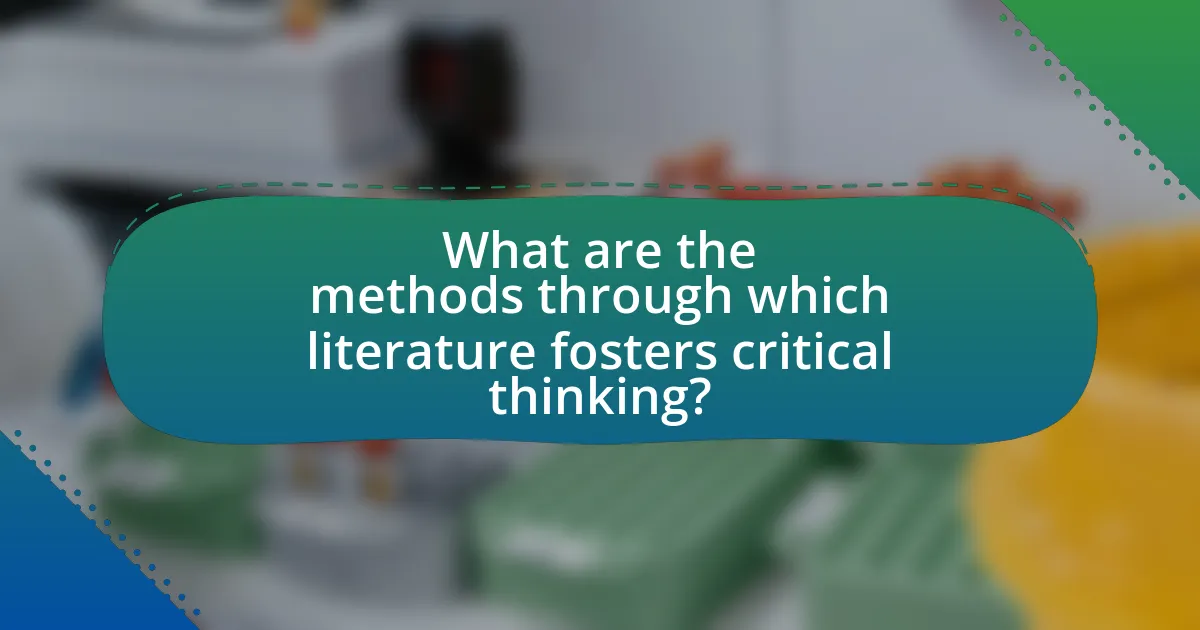
What are the methods through which literature fosters critical thinking?
Literature fosters critical thinking through methods such as analysis of complex characters, exploration of diverse perspectives, and engagement with thematic dilemmas. Analyzing complex characters encourages readers to evaluate motivations and moral choices, enhancing their ability to assess human behavior critically. Exploring diverse perspectives allows readers to understand and appreciate different viewpoints, fostering empathy and open-mindedness, which are essential for critical thinking. Engaging with thematic dilemmas presents readers with moral and ethical questions, prompting them to reflect on their values and reasoning processes. These methods collectively enhance analytical skills, promote deeper understanding, and encourage thoughtful discourse, thereby validating the role of literature in developing critical thinking skills.
How do discussions and debates about literature enhance critical thinking?
Discussions and debates about literature enhance critical thinking by encouraging individuals to analyze, interpret, and evaluate diverse perspectives. Engaging in these dialogues requires participants to articulate their thoughts clearly, defend their viewpoints, and consider counterarguments, which fosters deeper cognitive processing. Research indicates that such interactions promote higher-order thinking skills, as evidenced by a study published in the Journal of Educational Psychology, which found that students who participated in literature discussions demonstrated improved analytical skills and greater ability to synthesize information. This active engagement with texts and ideas cultivates a more nuanced understanding of complex themes, ultimately strengthening critical thinking abilities.
What techniques can be used to facilitate literary discussions?
Techniques that can be used to facilitate literary discussions include Socratic questioning, small group discussions, and the use of literary circles. Socratic questioning encourages participants to think critically by asking open-ended questions that promote deeper analysis of the text. Small group discussions allow for diverse perspectives and foster a collaborative environment where participants can share insights and challenge each other’s interpretations. Literary circles, where each member takes on a specific role (such as discussion leader or summarizer), help structure the conversation and ensure that all voices are heard. These techniques have been shown to enhance engagement and critical thinking, as evidenced by studies indicating that structured discussions lead to improved comprehension and analytical skills among participants.
How does peer feedback contribute to critical thinking in literature studies?
Peer feedback enhances critical thinking in literature studies by encouraging students to analyze and evaluate diverse perspectives on texts. This interaction prompts individuals to articulate their thoughts clearly and consider alternative interpretations, fostering deeper comprehension. Research indicates that engaging in peer review processes leads to improved analytical skills, as students must justify their critiques and reflect on the feedback received. For instance, a study published in the “Journal of Educational Psychology” by Topping (1998) found that peer assessment significantly boosts critical thinking abilities by requiring students to engage with and assess the reasoning of their peers.
What role does writing play in developing critical thinking through literature?
Writing plays a crucial role in developing critical thinking through literature by enabling individuals to analyze, synthesize, and evaluate ideas. When engaging with literary texts, writing encourages readers to articulate their interpretations, fostering deeper comprehension and reflection on themes, characters, and contexts. This process enhances critical thinking skills as it requires individuals to construct arguments, support them with evidence from the text, and consider multiple perspectives. Research indicates that writing about literature, such as through essays or discussions, significantly improves analytical skills, as evidenced by studies showing that students who write critically about texts demonstrate higher levels of engagement and understanding compared to those who do not.
How can literary analysis essays improve critical thinking skills?
Literary analysis essays enhance critical thinking skills by requiring students to interpret texts, evaluate arguments, and synthesize information. This process involves analyzing themes, character motivations, and narrative techniques, which fosters deeper comprehension and encourages questioning of underlying assumptions. Research indicates that engaging with complex literary works promotes cognitive flexibility, allowing individuals to consider multiple perspectives and develop reasoned arguments. For instance, a study published in the “Journal of Educational Psychology” by Paul and Elder (2014) found that students who participated in literary analysis demonstrated improved analytical reasoning and problem-solving abilities compared to those who did not engage in such exercises.
What are the benefits of creative writing in enhancing critical thought?
Creative writing enhances critical thought by fostering imagination, encouraging perspective-taking, and improving analytical skills. Engaging in creative writing requires individuals to construct narratives, which promotes the ability to analyze situations from multiple viewpoints. This process enhances cognitive flexibility, allowing writers to evaluate and synthesize information effectively. Research indicates that students who participate in creative writing exercises demonstrate improved problem-solving abilities and greater capacity for critical analysis, as evidenced by a study published in the Journal of Educational Psychology, which found that creative writing activities significantly correlated with higher critical thinking scores among participants.
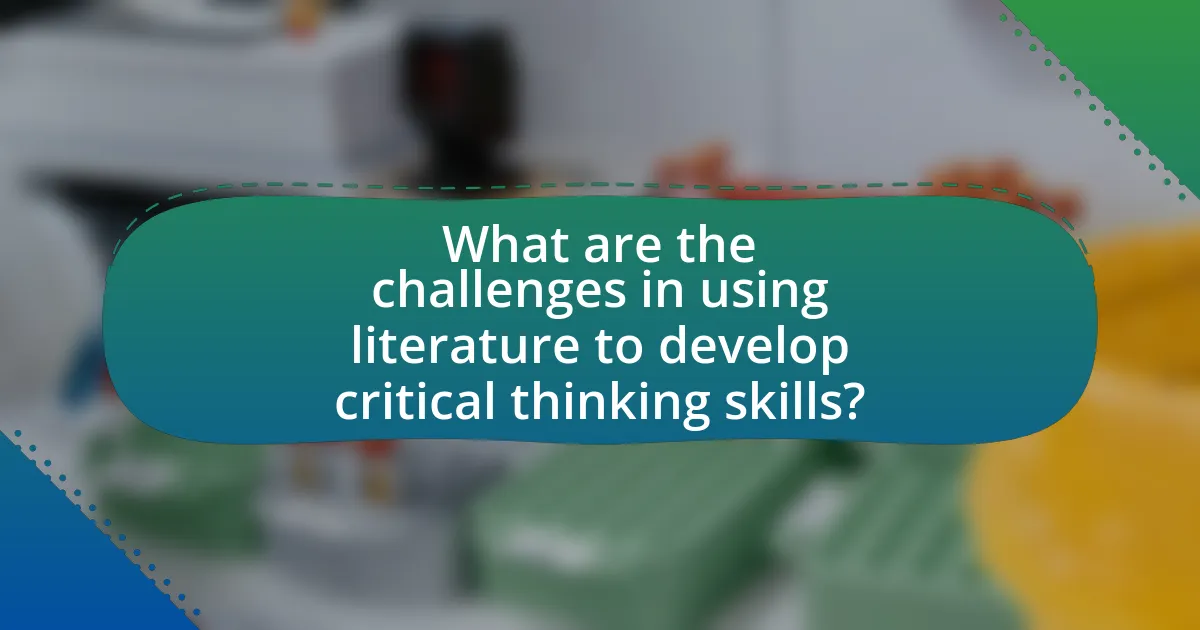
What are the challenges in using literature to develop critical thinking skills?
The challenges in using literature to develop critical thinking skills include varying interpretations of texts, the complexity of themes, and the subjective nature of literary analysis. Different readers may derive distinct meanings from the same piece of literature, which can lead to confusion and hinder the development of a unified critical perspective. Additionally, literature often presents intricate themes that require deep analysis and synthesis of ideas, making it difficult for some individuals to engage critically. The subjective nature of literary analysis can also pose a challenge, as personal biases and emotional responses may cloud objective evaluation, complicating the process of critical thinking. These factors collectively create obstacles in effectively utilizing literature as a tool for enhancing critical thinking skills.
What obstacles do educators face in teaching literature for critical thinking?
Educators face several obstacles in teaching literature for critical thinking, including a lack of resources, varying student engagement levels, and standardized testing pressures. Limited access to diverse literary texts can hinder the ability to present multiple perspectives, which is essential for fostering critical thinking. Additionally, students’ differing levels of interest and comprehension can make it challenging to engage all learners effectively. Furthermore, the emphasis on standardized testing often prioritizes rote memorization over analytical skills, restricting educators’ ability to focus on critical thinking development through literature. These factors collectively impede the effectiveness of literature as a tool for enhancing critical thinking skills in students.
How can differing interpretations of literature complicate critical thinking development?
Differing interpretations of literature can complicate critical thinking development by introducing ambiguity and conflicting viewpoints that challenge a reader’s ability to form coherent arguments. When literature is interpreted in various ways, it forces individuals to confront multiple perspectives, which can lead to confusion rather than clarity. This complexity can hinder the development of critical thinking skills, as individuals may struggle to evaluate the validity of differing interpretations and reconcile them with their own understanding. Research indicates that exposure to diverse interpretations can enhance critical thinking, but it can also overwhelm learners if they lack the skills to analyze and synthesize these viewpoints effectively. Therefore, while differing interpretations can enrich discussions, they can simultaneously complicate the critical thinking process by creating cognitive dissonance and uncertainty.
What strategies can overcome these challenges?
To overcome challenges in developing critical thinking skills through literature, educators can implement strategies such as integrating diverse literary genres, fostering discussion-based learning, and utilizing reflective writing exercises. Integrating diverse literary genres exposes students to various perspectives and encourages analytical thinking, as evidenced by studies showing that exposure to different narrative styles enhances cognitive flexibility. Fostering discussion-based learning promotes critical dialogue among students, which research indicates improves comprehension and critical analysis skills. Finally, utilizing reflective writing exercises allows students to articulate their thoughts and engage in self-assessment, a method supported by educational research that demonstrates its effectiveness in enhancing critical thinking abilities.
How can literature be effectively integrated into critical thinking curricula?
Literature can be effectively integrated into critical thinking curricula by using texts that challenge students to analyze, interpret, and evaluate complex themes and characters. Engaging with diverse literary works encourages students to question assumptions, draw connections, and articulate their perspectives, fostering deeper cognitive skills. For instance, studies show that discussing moral dilemmas in literature, such as those found in works by authors like Shakespeare or Toni Morrison, enhances students’ ability to reason and debate, as evidenced by research from the National Council of Teachers of English, which highlights the positive impact of literary analysis on critical thinking development.
What are some best practices for incorporating literature into critical thinking lessons?
Incorporating literature into critical thinking lessons can be effectively achieved through several best practices. First, selecting diverse literary texts that present complex themes encourages students to analyze different perspectives. For instance, using works like “To Kill a Mockingbird” by Harper Lee allows students to engage with moral dilemmas and societal issues, fostering deeper discussions.
Second, implementing guided discussions and Socratic questioning helps students articulate their thoughts and challenge assumptions. Research indicates that such methods enhance critical thinking skills by promoting active engagement with the text (Paul & Elder, 2006).
Third, integrating writing assignments that require students to respond to literature analytically encourages them to synthesize their ideas and develop arguments. This practice not only reinforces comprehension but also cultivates the ability to construct logical reasoning.
Lastly, encouraging interdisciplinary connections between literature and other subjects, such as history or philosophy, broadens students’ understanding and application of critical thinking across contexts. This approach aligns with educational frameworks that emphasize the importance of cross-curricular learning in developing comprehensive critical thinking skills.
How can technology enhance the study of literature for critical thinking?
Technology enhances the study of literature for critical thinking by providing interactive platforms that facilitate deeper analysis and engagement with texts. Digital tools such as online discussion forums, annotation software, and multimedia resources allow students to collaborate, share interpretations, and access diverse perspectives, which fosters critical dialogue. For instance, platforms like Google Docs enable real-time collaboration, encouraging students to critique and build upon each other’s ideas. Additionally, access to vast online databases and literary criticism enhances research capabilities, allowing for informed discussions that challenge assumptions and promote analytical thinking. Studies have shown that students who engage with literature through technology demonstrate improved critical thinking skills, as they learn to evaluate sources and construct well-reasoned arguments.
What practical tips can enhance the role of literature in developing critical thinking skills?
Engaging with diverse literary genres enhances critical thinking skills by exposing readers to various perspectives and complex themes. Readers should analyze characters’ motivations and conflicts, which fosters deeper comprehension and evaluative skills. Discussing literature in groups encourages dialogue and debate, allowing individuals to articulate their thoughts and challenge assumptions. Additionally, writing reflective essays on literary works promotes synthesis of ideas and critical analysis. Research indicates that students who engage in literary discussions demonstrate improved analytical skills, as shown in studies by the National Council of Teachers of English, which highlight the correlation between literature study and critical thinking development.
